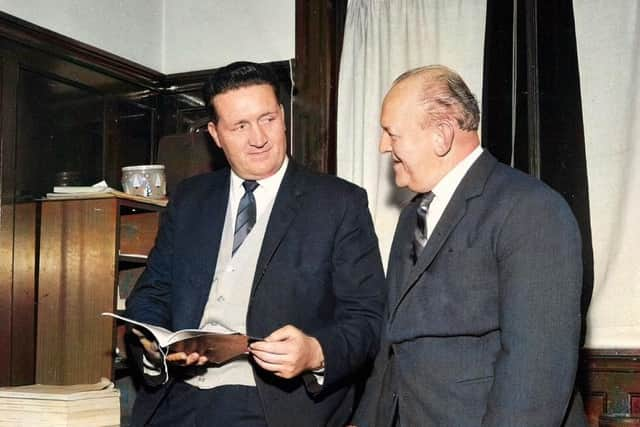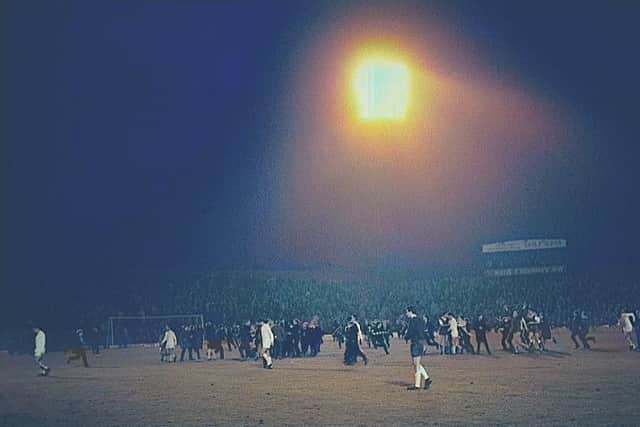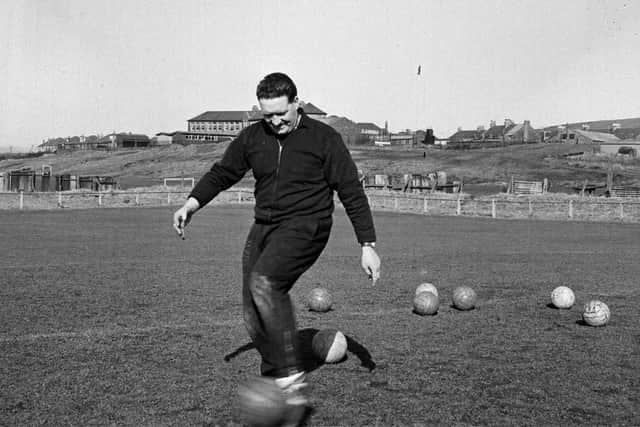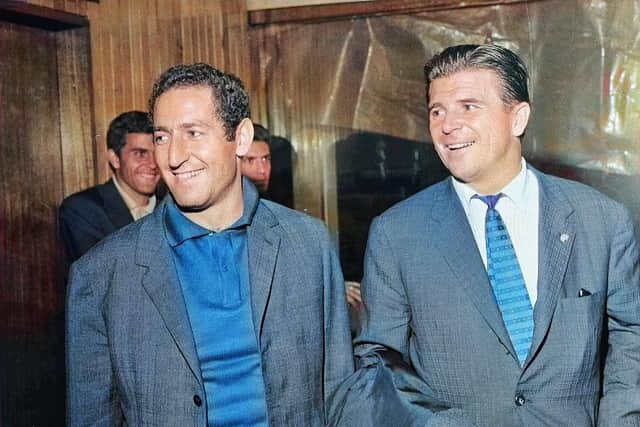When Jock Stein revived Hibs and led them to victory over five-time European champions Real Madrid
and live on Freeview channel 276
The former Accrington Stanley boss arrived in December 1961 after failed attempts by Hibs to attract St Johnstone boss Bobby Brown or Dunfermline Athletic manager Jock Stein to Easter Road but endured a tough time at the helm, leaving with a win rate of just over 37 per cent.
Galbraith deserves credit for bringing Pat Stanton into the first team as well as signing Willie Hamilton, Neil Martin, John Parke, and Pat Quinn. But what about the man who replaced him?
Stein leaves East End and arrives at Easter Road
Advertisement
Hide AdAdvertisement
Hide AdJock Stein had signed a five-year contract with the Pars in March 1960, taking the reins after a spell as manager of Celtic reserves with the East End Park side languishing in the relegation zone with just six games remaining. Speaking to the media at his unveiling he said: “I have no magic wand but will do everything in my power to save [Dunfermline] from relegation.”
Stein duly led the side to six consecutive wins and safety, including a 3-2 victory over Celtic in his first game in charge, and made just one team alteration as he got the best out of the existing squad.
His work with the Pars sparked rumours of a move to greater things in early 1964 and by the end of February his departure was official, the Pars green-lighting his exit at the end of the season. But the Hibs hierarchy, perhaps fearing relegation, managed to tempt Stein across the Forth before the end of the campaign.
Summer Cup success


One of Stein’s first acts as Hibs manager was to bring in John McNamee, who had been deemed surplus to requirements at Celtic, and the defender became an integral part of a Hibs team that remained broadly the same as it had been under Galbraith, with Stein – a ‘tracksuit manager’ – getting the best out of the existing squad.
Advertisement
Hide AdAdvertisement
Hide AdHe also had the penultimate Summer Cup with which to contend so the hard work continued at Easter Road after the end of the league season.
Hearts won the East section of the tournament but later withdrew owing to tour commitments in the United States and Hibs defeated Stein’s former club Dunfermline in a play-off for a place in the semi-finals of the competition. Hibs went down 4-3 to Kilmarnock in the first leg at Rugby Park but won the return leg at Easter Road 3-0, advancing to the final against Aberdeen.
A typhoid outbreak in the north-east postponed the two-legged final at the start of June and the ties were eventually played in August.


With the two teams locked on 4-4 after both legs were played, Aberdeen won the coin toss to host the deciding game and Stein’s Hibs won 3-1 at Pittodrie thanks to goals from Peter Cormack, Willie Hamilton, and Jim Scott to lift the trophy, which remains at Easter Road to this day.
Glamour friendly
Advertisement
Hide AdAdvertisement
Hide AdHibs’ commitment to innovation has been well documented over the years and with the side not involved in European football in 1964/65 but playing attractive, ‘fast-moving’ football under Stein, a concerted effort was undertaken to attract Real Madrid to Edinburgh for a friendly match in October.
Hibs shelled out £10,000 (more than £225,000 in today’s money) plus expenses to secure Los Blancos as friendly opposition, a little over three years after defeating Barcelona 3-2 at Easter Road on Inter-Cities Fairs Cup duty.


Real had won three of their first four league games and, rather ominously, stuck six past both Las Palmas and Córdoba inside the space of a week. By the end of the 1964/65 season they had lost just four game, winning La Liga by four points over city rivals Atlético.
The Spaniards had already won five European Cups before their jaunt to Scotland and boasted an impressive squad of players, even with veteran magician Alfredo di Stefano having left for Espanyol as Amancio Amaro, Francisco Gento, Ramón Grosso, Ferenc Puskás, and Ignacio Zoco all played at Easter Road.
Advertisement
Hide AdAdvertisement
Hide AdBut Miguel Muñoz’s team were humbled by Hibs on the evening of Wednesday October 7, 1964. Hamilton terrorised the visiting defence and teenager Peter Cormack scored a 20-yard effort from Scott’s cross with just 13 minutes on the clock before Zoco deflected a Quinn free kick past José Araquistáin to hand Hibs, wearing green shorts so as not to clash with the all-white of Madrid, a famous victory in front of a crowd of 32,000.
Stein and the board had successfully turned the spotlight back on to Hibs.
Stein’s departure
Stein’s work did not go unnoticed, especially in the east end of Glasgow. Celtic tried repeatedly to coax Stein back to Celtic Park, although Wolves also made an approach. Stein, according to Archie MacPherson’s 2007 biography, approached chairman Bob Kelly to ask his advice about the Wolves offer but in the hope he might be offered the Parkhead post.


Stein rejected Kelly’s offer first to be Sean Fallon’s assistant, then co-manager, with the Celts chief relenting when Stein threatened to take the Wolves job.
Advertisement
Hide AdAdvertisement
Hide AdThe end-of-season move was announced at the end of January but Stein left in early March, after arranging for Dundee boss Bob Shankly to take his place in the Easter Road hotseat.
Hibs were near the top of the league and in the last four of the Scottish Cup when Stein departed but they finished fourth and lost to Dunfermline in the cup.
He later admitted that leaving Hibs when he did ranked as ‘probably my most embarrassing experience’ in football.
Stein remains, thanks to his 62 per cent win rate, Hibs’ most successful permanent manager, ranking higher than league and cup double-winner Dan McMichael (58%), Scottish Cup hoodoo-breaker Alan Stubbs (58%), Shaw (51.49%), and his successor Bob Shankly (50.87%) – but one wonders what Hibs might have achieved had he stayed until the end of the 1964/65 campaign.
Comment Guidelines
National World encourages reader discussion on our stories. User feedback, insights and back-and-forth exchanges add a rich layer of context to reporting. Please review our Community Guidelines before commenting.